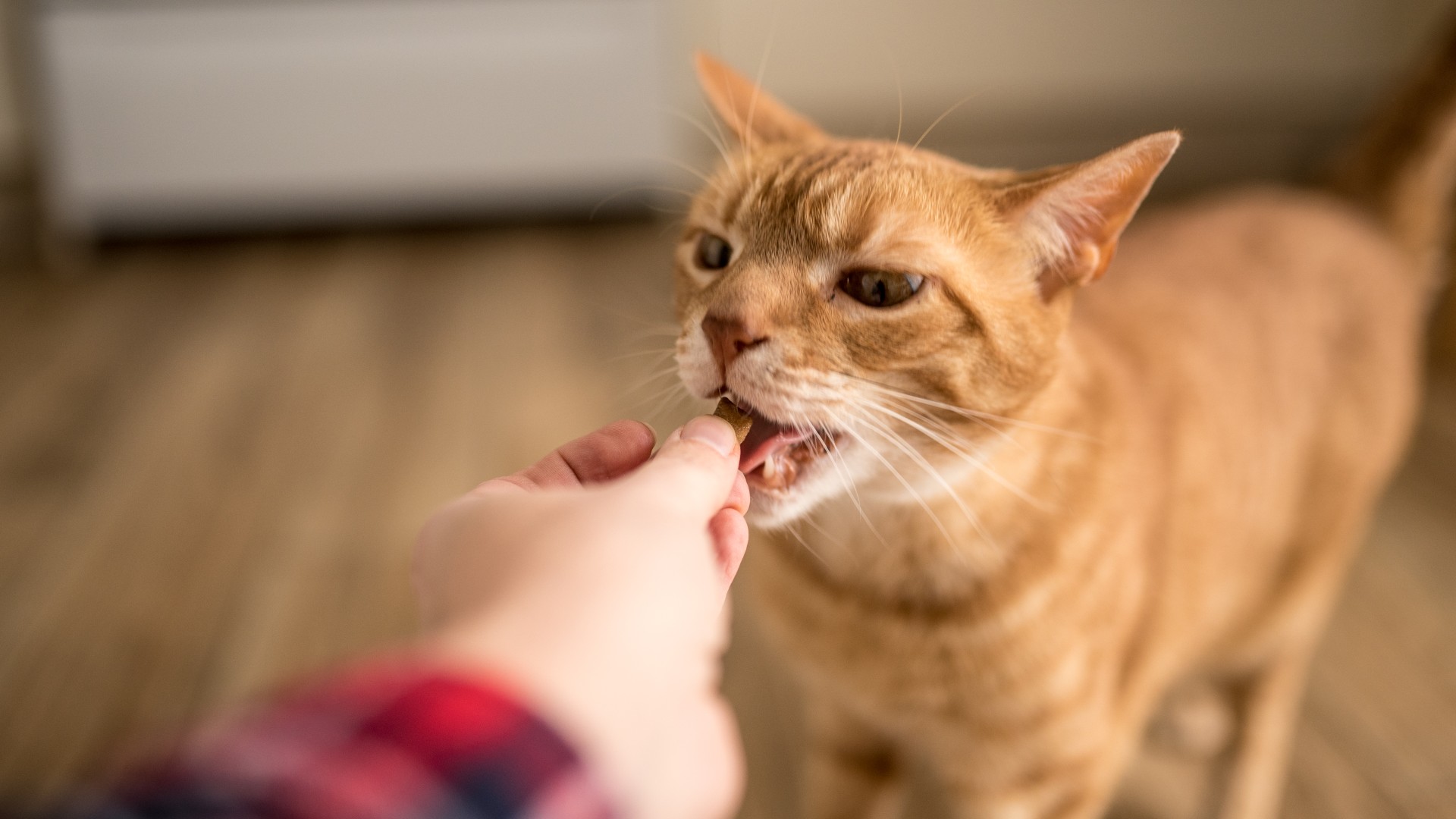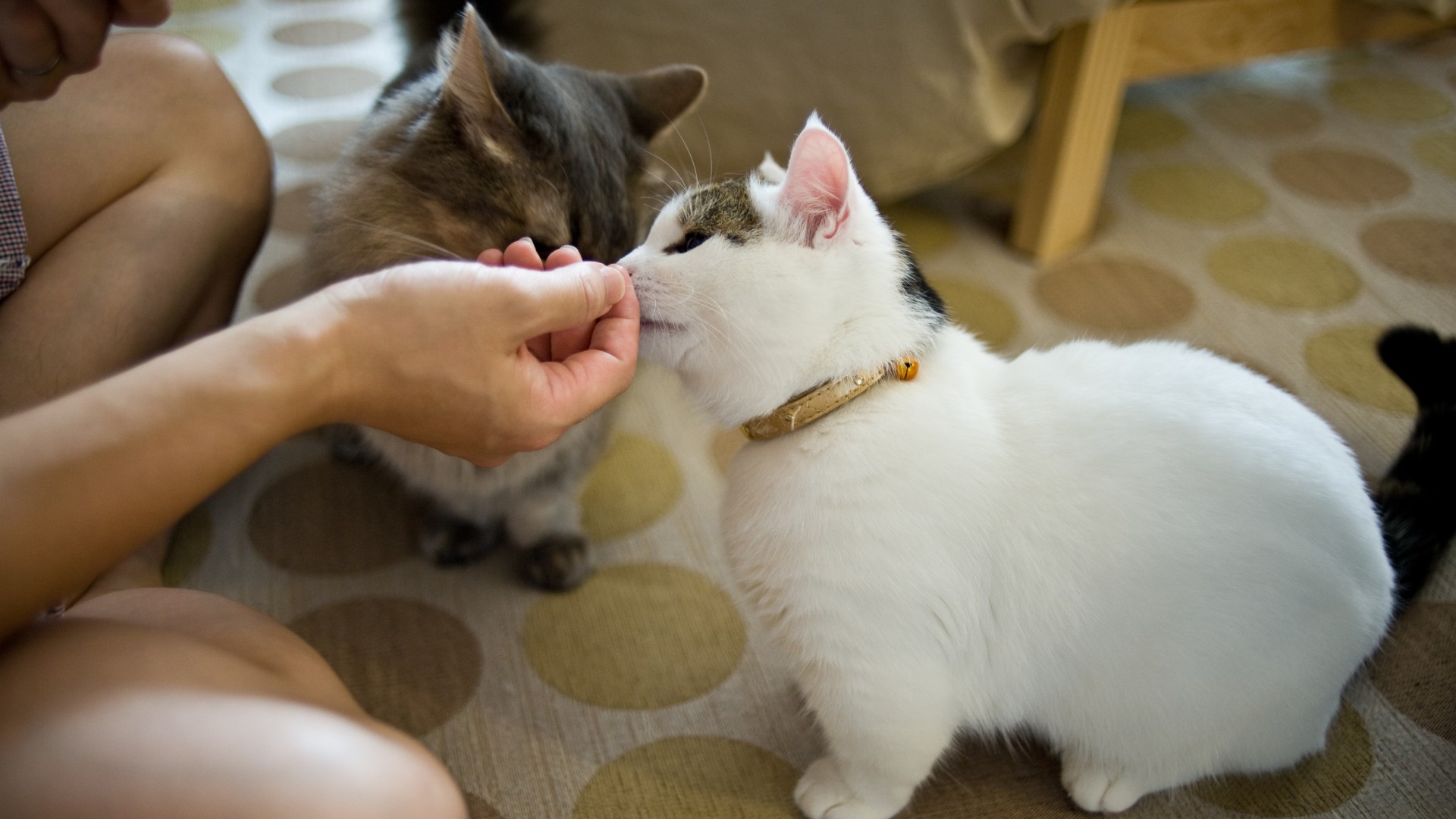Are Cat Treats Healthy?
Giving treats can be a great way to bond with your feline friend, but are cat treats healthy?

Pondering the question, ‘are cat treats healthy?’ You’re in the right place! While dishing out the kitty treats to your precious furkid every day may seem like a no-brainer, there are definitely a few things worth considering.
Giving treats can be great for showing your love when you come home, playing a game, or training. However, we need to remember that even the best cat treats can contain lots of calories, which can quickly add up! With that in mind, treats should make up less than 10% of your cat’s daily calorie intake.
Which treats you choose is crucial too, as many contain far too much sugar. If you’re choosing home-made, it’s important to be aware that some human foods are poisonous to cats. So, both the quality of the treats and moderation is key.
Which cat treats are healthiest?
People often ask, “are cat treats the same as cat food?”. For shop-bought cat treats, the answer is no! The best cat food is nutritionally balanced, cat treats are not.
However, you absolutely can choose to use some of your cat’s food as a treat. In fact, in some circumstances, this is the best option. Remember, in your cat’s eyes the treat comes from having a fuss made of them while eating some yummy food that you’re ‘sharing’ with them outside of mealtimes. If your cat has an underlying medical condition or is overweight, taking some food from their daily allowance to use as treats is often the best option. You could even get creative with it and turn the food into some baked treats!
If you’re buying treats, always be sure to check the ingredients list. It’s best to avoid treats that are high in sugar. Remember that this includes honey and molasses! High sugar treats can lead to weight problems, as well as being bad for the teeth. Ideally, try to avoid too many artificial colors and flavors too, just as you would for a child.
If you choose to bake your own treats, beware of the myth that because they’re home-baked, they must be healthy. You still need to avoid high sugar recipes. The internet is full of recipes, some of them good, some of them not so! It’s really important to be aware that many human foods are actually dangerous for cats. Some of the more common ones include:
- Chocolate
- Grapes or raisins
- Onions
- Garlic
- Xylitol
- Raw eggs
- Alcohol
- Milk and cheese
- Tea, coffee or energy drinks
So, if you are choosing home-baked cat treats, try to pick recipes that are either ‘vet approved’ or, even better, are from a board-certified veterinary nutritionist.
Are cat treats good for cats?

If cat treats are given in moderation, they can be good for bonding, training, and mental stimulation in games or puzzle toys. They can also help with giving medicines — in fact, some treats are specially designed for this! You can also purchase treats designed with certain health benefits in mind, such as helping eliminate fur balls or maintaining dental health. If you are looking for treats with added benefits, ask your vet which treats would be best for your cat. So, yes, treats can certainly have their benefits.
Are there treats that are bad for cats? Well, we all know how tempting it is to share scraps from our own meal with our feline friend, especially when they are rubbing lovingly against our legs! However, human food is best avoided, for many reasons. The salt content is usually too high, some foods can make a cat unwell, plus sharing scraps contributes to obesity and encourages begging.
Historically milk, cream and cheese were popular choices for cat treats. However, cats actually can’t tolerate the lactose in milk, meaning dairy products can cause sickness and diarrhea. Cat milk is a safer alternative but is calorie-dense, so moderation is key as cats can quickly become obese!
Is it bad to give my cat treats every day?
Giving too many treats can lead to obesity, which is a growing problem in cats. Obesity can reduce a cat’s life expectancy by contributing to heart disease, diabetes, and joint problems. Too many treats can also lead to nutritional imbalances. Cat food is nutritionally complete, cat treats are not. If your cat is full from eating treats they may eat less of their cat food, leading to a lack of nutrients. Giving lots of treats can also cause cats to become fussy eaters.
You can give your cat a treat every day, as long as you follow some simple guidelines. Firstly, all of the treats given in a day should never make up more than 10% of your cat’s daily calorie intake. Ideally, it should be around 5%. Remember to reduce the amount of food you are giving as well, to account for the calories the treats are providing. Choose lower-calorie, good-quality cat treats or treat recipes. Finally, remember to always ensure your cat has access to fresh drinking water - the best pet water fountains are great for encouraging feline’s to get plenty of fluid.
Final thoughts
Giving treats can provide a wonderful bonding opportunity through cuddles and play. It’s natural to want to treat your feline friend! Just remember that treats should be just that, a ‘treat’, so a little goes a long way. If your cat has an underlying health condition or is overweight, it’s important to speak with your vet about which treats would be best.
PetsRadar Newsletter
Get the best advice, tips and top tech for your beloved Pets
Sarah-Jane Molier graduated in 2009 and has been enjoying life as a vet ever since. She currently works as Head Veterinarian in a small animal practice. Sarah-Jane particular enjoys internal medicine, alongside her managerial role. When not working in practice Sarah-Jane enjoys sharing her knowledge and helping pet parents by writing on a wide variety of animal health and medicine topics. In her spare time Sarah-Jane loves walking Nero (her rescue dog), gardening with her two young children and reading.

